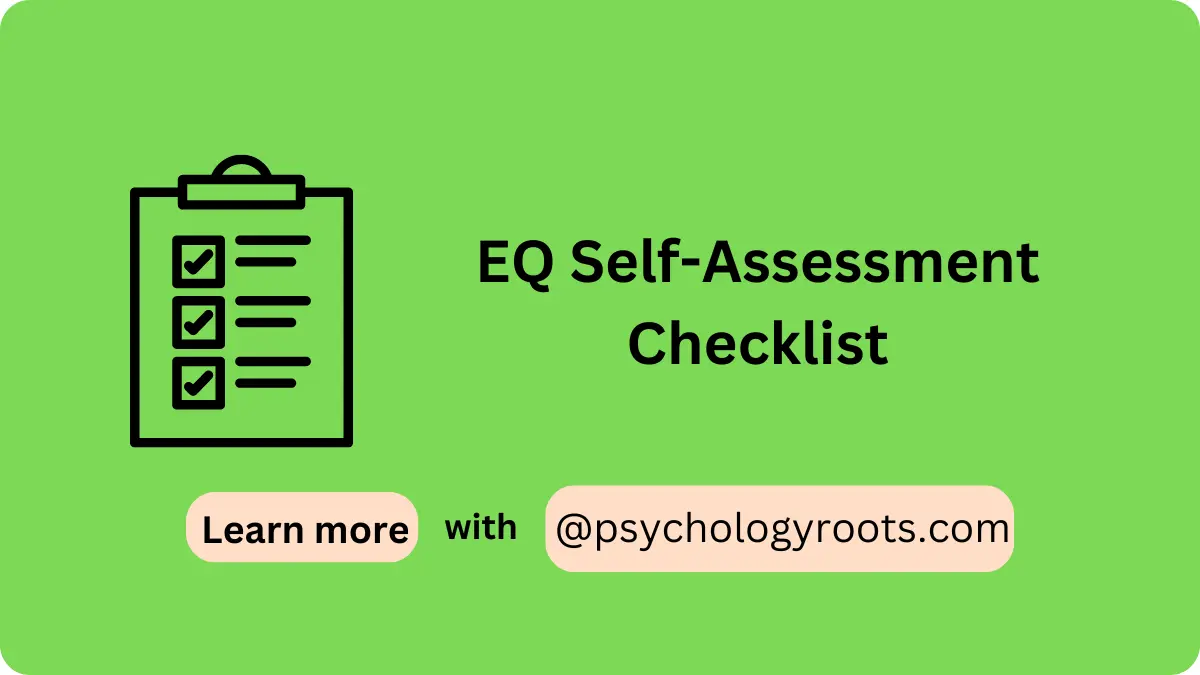Table of Contents
EQ Self-Assessment Checklist
Here in this post, we are sharing the “EQ Self-Assessment Checklist”. You can read psychometric and Author information. We have thousands of Scales and questionnaires in our collection (See Scales and Questionnaires). You can demand us any scale and questionnaires related to psychology through our community, and we will provide you with a short time. Keep visiting Psychology Roots.
About EQ Self-Assessment Checklist
Scale Name
EQ Self-Assessment Checklist
Author Details
Emily A. Sterrett, Ph.D.
Translation Availability
Not sure

Background/Description
The EQ Self-Assessment Checklist, developed by Emily A. Sterrett, Ph.D. and published by HRD Press in 2014, is a tool designed to evaluate an individual’s level of emotional intelligence (EQ). Emotional intelligence, a critical component in personal and professional success, involves the ability to recognize, understand, and manage emotions—both one’s own and those of others.
This checklist serves as a self-assessment tool that helps individuals measure their emotional intelligence in various areas, such as self-awareness, self-regulation, motivation, empathy, and social skills. These components of EQ are essential for navigating personal relationships, workplace interactions, and leadership roles. By identifying strengths and areas for improvement, the checklist allows users to develop strategies for enhancing their emotional intelligence and applying it to real-world situations.
Administration, Scoring and Interpretation
- Target Population: The checklist is suitable for adults in professional settings, as well as individuals interested in personal development.
- Format: The checklist is a self-report questionnaire that can be completed individually. It is available in both paper format and digital format through HRD Press.
- Administration: Participants are asked to respond to a series of statements related to the key aspects of emotional intelligence, such as managing stress, understanding others’ emotions, and controlling impulsive behavior. Completion time is approximately 15-20 minutes.
- Scoring: Responses are measured on a Likert scale, typically ranging from Strongly Disagree to Strongly Agree. Higher scores in specific areas indicate stronger emotional intelligence skills, while lower scores reveal opportunities for development.
- Interpretation: After completing the checklist, individuals can reflect on the results to determine where their EQ is strongest (e.g., empathy, self-awareness) and where it could be improved (e.g., self-regulation, social skills). This provides a basis for personal development or professional coaching aimed at improving emotional intelligence competencies.
Reliability and Validity
The EQ Self-Assessment Checklist has demonstrated strong internal consistency and reliability in measuring emotional intelligence across different domains. It aligns with widely recognized models of emotional intelligence, such as Daniel Goleman’s Emotional Intelligence Framework.
- Reliability: The tool exhibits high test-retest reliability, ensuring consistent results over time.
- Validity: Construct validity has been established, with the checklist correlating well with other emotional intelligence measures.
Available Versions
Multiple-Items
Reference
Sterrett, E. A. (2014). EQ Self-Assessment Checklist. HRD Press, Inc. Click here for more details
Important Link
Scale File:
Frequently Asked Questions
Q: What does the EQ Self-Assessment Checklist measure?
A: It measures different aspects of emotional intelligence, including self-awareness, empathy, motivation, and social skills.
Q: How long does it take to complete?
A: The checklist typically takes 15-20 minutes to complete.
Q: Who can use this checklist?
A: It is designed for individuals in both professional and personal settings, particularly those looking to improve their emotional intelligence.
Q: What areas of emotional intelligence are assessed?
A: The checklist assesses areas such as self-regulation, empathy, social skills, motivation, and self-awareness.
Q: How are the results used?
A: The results can help individuals identify their emotional intelligence strengths and areas for improvement, guiding them toward personal or professional development.
Disclaimer
Please note that Psychology Roots does not have the right to grant permission for the use of any psychological scales or assessments listed on its website. To use any scale or assessment, you must obtain permission directly from the author or translator of the tool. Psychology Roots provides information about various tools and their administration procedures, but it is your responsibility to obtain proper permissions before using any scale or assessment. If you need further information about an author’s contact details, please submit a query to the Psychology Roots team.
Help Us Improve This Article
Have you discovered an inaccuracy? We put out great effort to give accurate and scientifically trustworthy information to our readers. Please notify us if you discover any typographical or grammatical errors.
Make a comment. We acknowledge and appreciate your efforts.
Share With Us
If you have any scale or any material related to psychology kindly share it with us at psychologyroots@gmail.com. We help others on behalf of you.